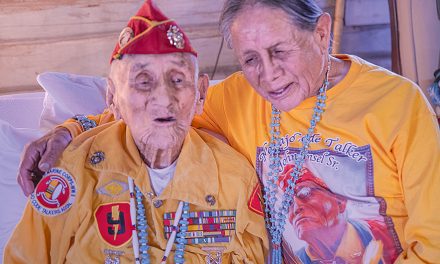
The new RSV shot, a national shortage, and what that means for you
By Sejal Parekh, M.D.
Special to the Times
Editor’s note: Dr. Sejal Parekh is a health equity media fellow at Stanford University. She worked as a pediatrician at Chinle Comprehensive Health Care Facility.
As a pediatrician, I have treated many critically ill infants whose symptoms start as the common cold but quickly progress to difficulty breathing. The culprit is often RSV, or respiratory syncytial virus.
Hospitalization rates due to RSV are seven times greater for Native children than the national average, according to a recent study. Housing conditions, lack of running water, and distance to the hospital often contribute to these high hospitalization rates. In kids under five years of age, RSV causes up to 80,000 hospitalizations and 300 deaths per year in the U.S. In adults older than 65 years of age, RSV causes up to 160,000 hospitalizations and 10,000 deaths per year nationwide.
This year there is a new shot to prevent RSV infection. However, the manufacturer
did not produce enough shots for babies, leading to a nationwide shortage. As of now, there is no shortage in the vaccine for pregnant women or for adults over 60. If you, your baby, or your elders are offered the RSV shot, please get it. The shot decreases your chances of getting sick and becoming hospitalized.
The new RSV shot
The RSV shot is very effective, decreasing risk of RSV hospitalization by 80% for healthy babies in clinical trials. Importantly, this protection is expected to last for up to five months.
Some of this research was conducted on Navajo Nation, with over 80 infants participating in Fort Defiance, Gallup, and Shiprock. The data looked even better for American Indian/Alaska Native babies in the study, who were at 90% lower risk of RSV infection after getting the shot.
The RSV shot for babies contains antibodies to the RSV virus. Instead of stimulating the body to create its own immunity, like traditional vaccines, the new shot gives babies immunity directly. Though this particular shot is new, this technology has been used safely in patients for over 35 years.
Demand is greater than supply, causing a nationwide shortage
Pediatricians on the reservation knew about the RSV shot long before it was available to order. “We knew about this because we had all been reading this paper from before, and then we looked at the data that had come out of the trials,” said Dr. Diana Hu, a pediatrician who has worked at Tuba City Regional Health Care Corporation for the last 38 years. “We already had a plan.”
Despite eagerly preparing to order the vaccine, hospitals across Navajo Nation and the country faced the same issue – inadequate supply. The manufacturer, Sanofi, cited “unprecedented demand” in a statement on its website, and has stopped accepting new commercial orders. The company reported that no new supply is expected to be available for this winter, but that it will eventually be able to fill existing orders placed by public vaccination programs. Sanofi has not announced a timeline to do so.
On top of a national shortage, hospitals across Navajo Nation had to navigate shot procurement processes, which can vary by state. For example, Arizona’s public vaccine program received more RSV shots than New Mexico’s, according to Dr. Hu, who is also the immunization coordinator and maternal child health consultant for the IHS Navajo Area. Consequently, IHS facilities received shots at different times. This has been “throwing a big wrench in our plans” to coordinate a push for babies to get the shot, said Dr. Hu.
Due to rationing, not all eligible babies will get the shot
This new RSV shot was initially meant to be given to every healthy infant under 8 months of age. However, due to the shortage, the CDC recommends prioritizing shots for babies at the highest risk. According to Dr. Hu, “the highest risk kids are the ex-premies, the kids with congenital heart disease, the kids with other neurologic devastation. They’re going to be our first priority when we have limited supplies. Second priority is obviously the youngest babies.”
Some IHS sites have received the RSV shot and have started administering it in line with these priorities. However, there will likely not be enough supply to protect every eligible baby.
Dr. Hu offered a potential solution. “There are two strategies for this prevention,” she said. “One is to prevent prenatally and the other is to prevent postnatally. The prenatal strategy may be more effective at this point because of a lack of shortage.”
Dr. Hu is referring to the RSV vaccine approved for pregnant mothers called ABRYSVO, which is readily available. Women between 32 and 36 weeks of pregnancy are typically eligible for this vaccine. The CDC recommends that women receive the vaccine to protect their newborn from RSV. If the mother obtains the vaccine more than 14 days before delivery, the baby generally does not need the RSV shot – mother’s immunity will transfer to the baby.
RSV on the Nation
In her guest essay in the Navajo Times last year, Ethel Branch, the attorney general of Navajo Nation, recounted how her son was hospitalized in the pediatric intensive care unit due to an RSV infection. “It ended up being for my son what I feared Covid would be,” Branch wrote, “with him experiencing frighteningly severe congestion and having the inability to breathe without machine assistance.”
Like Ms. Branch, many Diné parents have cared for their kids suffering from RSV. The Center for Indigenous Health estimates that 10% of all Native babies born in the Southwest are hospitalized due to RSV. That might explain why parents are eager to immunize their babies against the virus.
“When this gets available, would you be interested in getting it for your baby?” Dr. Hu asked her patients over the summer. She recounted “And they’re like, sure. So, we’ve had very good acceptance for those people that we’ve offered it to.”
RSV rates have already started to rise in Arizona. As public health systems try to tackle high rates of RSV infections, it is important to remember that vaccines are only one part of the solution. Dr. Lukejohn Day (Ogalala Lakota) emphasized the importance of other factors, such as housing and access to medical care, the absence of which increases the risk of disease.
“I think once we understand those, those give us opportunities to try to develop interventions,” said Dr. Day, the president of the Association of American Indian Physicians.
Dr. Laura Hammitt, the director of the Johns Hopkins Center for Indigenous Health, agreed that social factors affect health. Through her years of studying RSV on the Navajo Nation with tribal partners, she reflected on what she has learned: traditional teachings “really do hold the sort of original instructions for public health, and they recognize the connectedness of all things and emphasize communal responsibilities” which “contributes to a collective wellbeing.”
As you prepare for this winter, protect yourself and your family against RSV. Know the symptoms of RSV, which can include runny and stuffy nose, cough, fever, decreased appetite and wheezing. While most older children and adults will recover from RSV, it can be more dangerous for infants and then elderly.
If your doctor offers you an RSV shot for your baby, please take it. Pregnant women who are 32 to 36 weeks along and people over 60 are also eligible for an RSV shot and should take it.
If your baby is not able to receive the shot, you can take other measures to protect the little one. Wash your hands, wear a mask, and practice social distancing when possible. If your baby becomes sick with cough and congestion symptoms, keep them well hydrated. You can use a bulb suction and saline drops to remove mucus from their nose, which can help them breathe.
You can use acetaminophen (Tylenol) to manage fevers in most healthy babies. If your baby is breathing too fast, having trouble breathing, is very irritable despite consolation measures like feeding, or is making very few wet diapers, please seek medical help immediately.
Finally, please be a good family member and stay home if you are sick. RSV is contagious, and you might transmit it even after you recover from its symptoms.








 Highway 264,
Highway 264, I-40, WB @ Winslow
I-40, WB @ Winslow